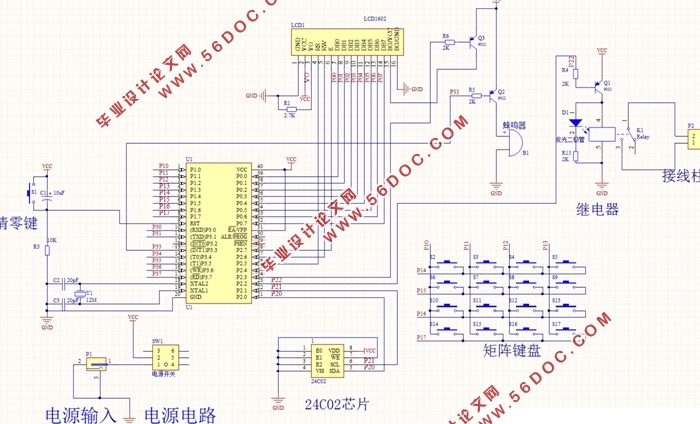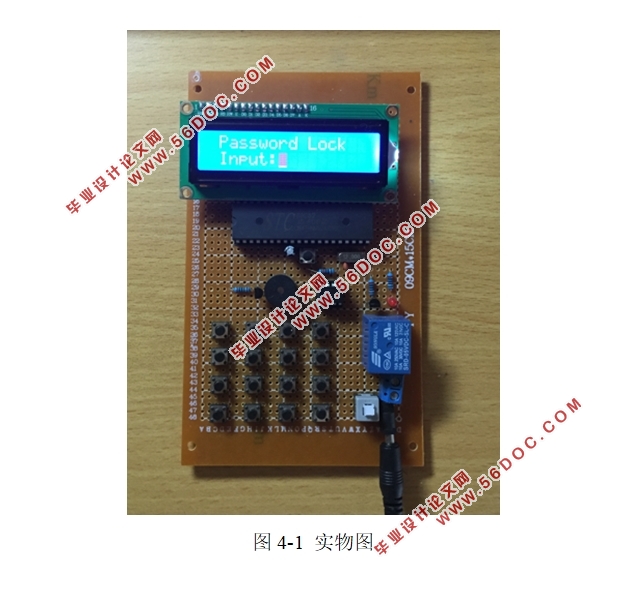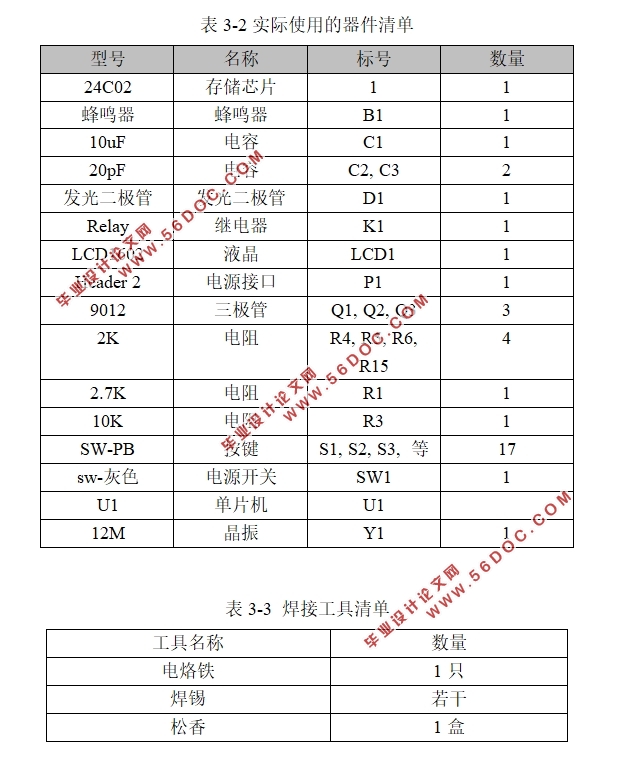基于单片机的门禁系统的设计(附电路原理图,元器件清单)(任务书,开题报告,外文翻译,论文12000字)
摘 要
由于电子密码锁的技术的发展和逐步完善,一种基于单片机的电子密码锁也走进了我们的生产生活中。电子密码锁是一种新型的锁具,它不再需要使用钥匙进行开锁,避免了因为钥匙的丢失和易复制性导致的安全性低的机械锁的缺点,保障了用户的安全。
本次设计运用Proteus软件绘制原理图,运用Keil软件进行C语言编程,对源代码进行调试和改正后可以自动形成hex文件。将hex文件录入到51单片机芯片之中,在Proteus硬件电路环境中进行仿真,当出现的理论结果和实际结果一致时再进行器件的焊接调试,保证电路设计的准确性。
本设计以STC89C52单片机为核心,配备电源电路、键盘输入电路、时钟电路、键盘接口电路、复位电路、报警电路等来实现密码的修改、保存、判断来使电磁锁正常开启和闭合以及开启报警的功能。此类锁具有原理简单、功能强大、安全性高、价格低廉、密码便于设置等特点,被广泛应用于储物柜、档案室、小区单元门等场所。
关键词:STC89C52 单片机设计 密码锁 声音报警
The design of Electronic password lock based on single-chip computer
Abstract
With the development and gradual improvement of the electronic code lock technology, the electronic code lock based on a single-chip has also entered our production and life. The electronic dongle is a new type of lock that eliminates the need for a key to unlock and avoid the shortcomings of a mechanical lock that is low due to the loss of the key and ease of reproduction to protect the user's security.
This design uses Proteus to draw the schematic diagram and the use of Keil for C language programming, the source code debugging and correction can automatically form a hex file. The hex file into the 51 microcontroller chip, the Proteus hardware circuit environment simulation, when the theoretical results and the actual results coincide with the device when the welding and commissioning to ensure the accuracy of circuit design.
The design of the STC89C52 microcontroller as the core, with power supply circuit, keyboard input circuit, clock circuit, keyboard interface circuit, reset circuit, alarm circuit, etc. to achieve the password to modify, save, judge the electromagnetic lock to open and close and open the alarm Features. This type of lock has the principle of simple, powerful, high security, low price, easy to set the password and other characteristics, is widely used in lockers, archives, cell units and other places.
Key Words: STC89C52; Single-Chip Microcomputer design; Combination lock; Voice alarm



目 录
摘 要 I
Abstract II
第一章 绪论 1
1.1 门禁系统的背景和意义 1
1.2 密码锁的发展趋势 1
1.3 密码锁的现状 2
1.4 单片机概述 3
第二章 总体设计 4
2.1 总体方案设计 4
2.2 本设计完成的工作 6
2.3基本设计方案 6
2.4预期结果 6
第三章 主要元器件及模块电路 7
3.1 主控芯片STC89C52 7
3.1.1 主要特性 7
3.1.2管脚说明 8
3.2 存储芯片 10
3.2.1 存储器的分类 10
3.2.2 24C02芯片及其作用 10
3.3 1602液晶显示屏 11
3.4 矩阵键盘 12
3.5 报警电路 14
3.6 密码锁电路 15
3.7复位电路 17
3.8 晶振电路 17
第四章 系统软件设计 20
4.1 Keil C编译环境 20
4.1.1 Keil C软件概述 20
4.1.2 Keil工程的建立过程 20
4.2 Proteus功能及特点 21
4.3实物图 22
第五章 结论 23
参考文献 25
致 谢 26
附录 27
|







